Current IssueFrom the Editors
We have had an extraordinary presidential primary in 2016: in addition to the establishment candidate, Hillary Clinton, we have an authoritarian demagogue, Donald Trump, who has unleashed a reactionary rage which harkens back to fascism, and another, Bernie Sanders, who calls himself a democratic socialist. The Foreign Policies of Sanders, Trump, and ClintonAmerica and the World in 2016 and Beyond
The world today is faced with crises on virtually every front, and any assessment of the foreign policy positions of the two major parties’ 2016 presidential candidates must measure how well they respond to these crises. The Contemporary Crisis of the American Ideology
Surveying the political scene in America, we are now witnessing the shattering of the last remnants of the American ideology that has maintained itself—despite strains—for almost 70 years. The ideas that justified the American economic and political system in the minds of most of our citizens throughout that long period came under stress during earlier storms—from the 1950s to the 1970s in particular—and a few beams and joists cracked but did not give way. Today the manifold crises of capitalism mean that the entire existing intellectual structure of American capitalism is breaking up. And because of the role that the U.S. capitalist class plays in the world, this represents a crisis of world capitalist leadership and legitimacy. The question then arises: What will the country’s rulers attempt to put in its place, and what alternative explanation will we on the left and in the labor movement be able to offer to the country’s workers? Welfare Reform and the Ghost of the “Welfare Queen”
Like a spectral apparition from a Shakespeare play or an M. Night Shyamalan film, the dreaded ghost of welfare reform is making a ghoulish comeback on Capitol Hill just in time for its twentieth anniversary. Kiddin’ on the SquareThe Politics and Poetics of Mose Allison’s Blues
In October 1969, pianist/ singer/composer Mose Allison recorded “Monsters of the Id.” At a time when recent history had witnessed a police riot at the 1968 Democratic Party Convention, the police crackdown on protesters at Berkeley’s People’s Park, and popular backlash against anti-war, New Left, counter-culture, and Black Power sentiment, Allison began by warning that the title characters no longer remain hidden, but have come out in full view. To the accompaniment of a slightly discordant horn section, Allison—singing in his characteristic style, with its idiosyncratic pauses and accents—spins a variety of often ghoulish metaphors that remain just as timely in today’s era of Tea Party, torture reports, Stand Your Ground, and Donald Trump: “They’re sprouting through the cracks ... They’re deputizing maniacs / Creatures from the swamp rewrite their own Mein Kampf.” The Neo-colonization of Central America
The colonization of Latin America never ended, it merely changed forms. Today this conquest continues, with transnational companies driving neo-colonization grounded in the continued exploitation of natural resources. This is nowhere more true than in Central America. The force of neo-colonization is strengthened by free-trade agreements and development plans that guarantee a company’s right to investment above the rights of the citizenry. Meanwhile, the indigenous populations face renewed dispossession and eviction to make way for global capital’s conquest. The Struggle Against Syriza’s Austerity Program
“The Hammer Blow of the Revolution”Rosa Luxemburg’s Critique of Bourgeois Democracy
Feminisms of the Left
Theses on Saving the Planet
Food Justice + Food SovereigntyCan the U.S. Food Justice Movement Join the Global Movement?
In the United States today, there is a fresh opening for progressive alliances. The various movements—Black Lives Matter, the Fight for $15, climate change, immigrant rights, LGBT rights, Bernie—have different roots, structures, and foci, but they share a recognition that we are being crushed by the newest form of capitalism—as they call it in Latin America, “capitalismo salvaje”1 (savage capitalism)—and that we must stand up to it with all our might, with all our people. Bogdan Denitch
Art Lipow
Donald Rooum
After Bernie—Party Time?
Death, Politics, and the Anthropocene
Blueprints for the Future
Designing Socialism is a complete reprint, as an e-book, of the special April 2012 issue of the American academic Marxist journal Science & Society. It continues that publication’s tradition of providing, as stated by its usual editor David Laibman, “a major worldwide pulse-taking of the state of play in theoretical socialism” every April of the years ending in “2” in every decade (Campbell, ed., 7). Syria Is Burning, But What Fuels the Fire?
Syria is the focus of the world’s attention. However, the closer the lens is focused, the more the picture seems obscured. Is what we are seeing a revolution? Is it a proxy war by international forces? Or, especially now with the emergence of the Islamic State, is this Islamic authoritarianism asserting itself? These questions are vital for anyone trying to piece together a picture of what is happening and especially for activists trying to understand what is at stake in Syria and what attitude to take toward events as they unfold. Secular Stagnation and Rosa Luxemburg’s Breakdown Theory
Memory and the Movies
This book is a fascinating incursion into the multiple oppositional uses of memory in world cinema. It shows, in a lively and insightful way, how movies bring the memory of past struggles forward into the present, to serve as an inspiration for the future. Inez Hedges distinguishes eight types of cultural cinematographic memory, which correspond to the eight chapters of the book: Homage to E.P. Thompson
Democracy, from King Hammurabi’s Time to Tomorrow
Radical America
Workers’ Stories of their Strikes in China
|
Blogs & On-Line FeaturesAnte-, anti-institutionalism
The Right To Educate
The 2016-2017 academic year has just started in occupied Palestine, and with it come the hopes and dreams of young students, but also the daily challenges of walking to school past Israeli soldiers, or driving through checkpoints in the West Bank, or assigning a culturally and politically relevant curriculum in annexed East Jerusalem, where Israel is trying to impose an Israeli curriculum in Palestinian schools. The Big Difference at Standing Rock Is Native Leadership All Around
This year’s massive buildup of resistance to the Dakota Access pipeline follows closely on the heels of the victory over Keystone XL pipeline, something often credited to feverish organizing by 350.org. But years before 350’s involvement, there was the Indigenous Environmental Network, which launched that movement and its “Keep It In the Ground” messaging. This time, with nearly 200 tribes unified behind the Standing Rock tribe’s opposition to the pipeline and more than 3,000 people gathered at the Standing Rock Sioux reservation, Native Americans are clearly leading the movement. Challenging Intellectuals Who Justify Iranian ImperialismSearching for Socialist Solidarity
Below we print a summary of a longer article by two Iranian socialists who are opposed to Iran’s military intervention in Syria. Their article is followed by a response from Frieda Afary and Joseph Daher. Class War by Other MeansTennessee, Volkswagen, and the Future of Labor
In 2008, the governments of the city of Chattanooga, Hamilton County, the state of Tennessee, and the United States all collaborated to provide Volkswagen (VW) with a $577 million subsidy package, the largest taxpayer handout ever given to a foreign-headquartered automaker in U.S. history. The bulk of the subsidy package, $554 million, came from local and state sources. The federal government also threw in $23 million in subsidies, bringing the grand total of taxpayer money that VW received in 2008 to $577 million. Reclaiming the Future
My most enduring memory of the student movement was of the power and the creativity that it brought. At Millbank, on Day X, in the university occupations. It was what some of us called a ‘magic moment’, where political space-time seemed to curve around us, where it felt that we might win, and that what we did mattered. While there was a degree of naive optimism that fueled that, there was also truth. Others had those moments during the 2011 riots, during 1968. Having that momentary power taken from you is painful – we don’t realise how little power we have until we glimpse it. Solidarity Statement with September 9, 2016, Prison Strike
Labor for Black Lives – a multi-ethnic network of workers in solidarity with the movement for Black lives, against capitalist exploitation and racist injustice and all oppression – fully endorses the Prison Strike, to begin on September 9, 2016, in which prisoners across the United States are organizing to end prison slavery and mass incarceration. We join our voices and forces with those, including 800+ prisoner members of the IWW's Incarcerated Workers Organizing Committee (IWOC), who say THIS STOPS TODAY. The Left Face of the Putin RegimePolitical resolution of the Sixth Congress of the Russian Socialist Movement

We reproduce here the political resolution of the Sixth Congress of the Russian Socialist Movement (RSD), which was held in Moscow on May 8 and 9, published on May 12 on the RSD website [1] with the following statement:“This is our analysis of current trends in the evolving political system of Putinism (the ”patriotic consensus“), its socio-economic course, its growing militarization, its fears in the face of social revolt, as well as the state of the forces opposed to the regime.” The Politics of Che Guevara: A Review
Samuel Farber, The Politics of Che Guevara: Theory and Practice. Chicago: Haymarket Books, 2016. 192pp. $16.95 For two generations of activists, Ernesto Che Guevara has symbolized a kind of selfless heroism. His relative youth at his death in 1967 (he was 38) conserved his air of rebelliousness and the image of a man interested only in the struggle, rather than in power. Yet Sam Farber who acknowledges these qualities, describes him early in his new book, The Politics of Che Guevara, as “irremediably undemocratic”. The contradiction is striking and central to Farber’s critical analysis of Che’s life as a revolutionary. Reimagine Possibilities this Labor Day
What Does Black Lives Matter Want?
On August 1 the Movement for Black Lives (M4BL), a coalition of over sixty organizations, rolled out “A Vision for Black Lives: Policy Demands for Black Power, Freedom & Justice,” an ambitious document described by the press as the first signs of what young black activists “really want.” It lays out six demands aimed at ending all forms of violence and injustice endured by black people; redirecting resources from prisons and the military to education, health, and safety; creating a just, democratically controlled economy; and securing black political power within a genuinely inclusive democracy. Backing the demands are forty separate proposals and thirty-four policy briefs, replete with data, context, and legislative recommendations. Remembering Connie Crothers
Sometime in the late 1980s, as Against the Current was doing some cross-promotion with the European socialist magazine International Viewpoint, I was glancing through the list of U.S. subscribers to IV when a name jumped put at me: Connie Crothers. This was interesting, because I had a wonderful duet recording “Swish” (1982) by jazz pianist Connie Crothers with the percussion giant Max Roach. (This was the inaugural recording of Connie’s New Artists label – an impressive debut!) I immediately wrote to Connie – this was back in the Middle Bronze Age, before we did everything by email – and soon heard back. Indeed, she was the same Connie Crothers and delighted to hear from ATC. John Halle Replies to David Finkel on Politics
In his useful and perceptive review of Empowering Progressive Third Parties in the United States, David Finkel claims that I endorse the "ultra-left conclusion of historian Eric Chester’s True Mission that the concept of a national labor party has always been a ploy to keep labor ensnared and subordinate to the Democrats." Daraya
Anti-imperialism and the Syrian RevolutionWhat's At Stake in a Critical Test for the International Left
The Syrian Revolution has tested the left internationally by posing a blunt question: Which side are you on? Do you support the popular struggle against dictatorship and for democracy? Or are you with Bashar al-Assad's brutal regime, his imperial backer Russia, his regional ally Iran and Iran's proxies like Hezbollah from Lebanon? Tragically, too many have failed this test. |





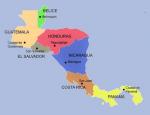
 The month of May witnessed the second round of massive general strikes to hit Greece in 2016. Mobilizations on May Day were followed by four days of strikes in the lead-up to the Syriza government passing its austerity pension bill.
The month of May witnessed the second round of massive general strikes to hit Greece in 2016. Mobilizations on May Day were followed by four days of strikes in the lead-up to the Syriza government passing its austerity pension bill. Rosa Luxemburg’s defense of socialist democracy and her critique of the Bolsheviks in her pamphlet The Russian Revolution (1918) are well known. Less well known and often forgotten is her critique of bourgeois democracy, its limits, its contradictions, and its narrow and partial character. We propose to examine this critical line of thought in some of her political writings without any pretentions to completeness.
Rosa Luxemburg’s defense of socialist democracy and her critique of the Bolsheviks in her pamphlet The Russian Revolution (1918) are well known. Less well known and often forgotten is her critique of bourgeois democracy, its limits, its contradictions, and its narrow and partial character. We propose to examine this critical line of thought in some of her political writings without any pretentions to completeness. This essay was originally a talk at the conference held at the New School for Social Research on April 21-22, 2016.
This essay was originally a talk at the conference held at the New School for Social Research on April 21-22, 2016.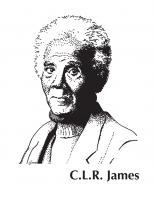
 I don’t need to tell you we face an existential threat. Scientists tell us we face a “climate emergency.” Last year was the hottest year ever recorded, beating 2014, which beat 2012. We break new records every year. The fourteen hottest years ever recorded have been recorded since 2000. January and February temperatures were torrid.
I don’t need to tell you we face an existential threat. Scientists tell us we face a “climate emergency.” Last year was the hottest year ever recorded, beating 2014, which beat 2012. We break new records every year. The fourteen hottest years ever recorded have been recorded since 2000. January and February temperatures were torrid. Perhaps ironically, shortly after writing the following memorial for Arthur Lipow, longtime New Politics sponsor Bogdan Denitch died on March 28 at the age of 86.
Perhaps ironically, shortly after writing the following memorial for Arthur Lipow, longtime New Politics sponsor Bogdan Denitch died on March 28 at the age of 86. The democratic left is poorer today for the loss of a longtime active comrade. Arthur Lipow, a former member of the editorial board of New Politics, died this year on January 6, aged 81, his wife Gretchen by his side. Arthur grew up in Southern California and attended high school in Pasadena. He received his BA in sociology from UCLA in 1955.
The democratic left is poorer today for the loss of a longtime active comrade. Arthur Lipow, a former member of the editorial board of New Politics, died this year on January 6, aged 81, his wife Gretchen by his side. Arthur grew up in Southern California and attended high school in Pasadena. He received his BA in sociology from UCLA in 1955. English anarchism has produced a number of fine cartoonists, including Clifford Harper, John Olday, Paul Petard, and, arguably, the artist Hunt Emerson and the writer Alan Moore.
English anarchism has produced a number of fine cartoonists, including Clifford Harper, John Olday, Paul Petard, and, arguably, the artist Hunt Emerson and the writer Alan Moore. Bernie Sanders’ presidential campaign has rocketed across the political landscape in this most abnormal of election seasons—an independent, self-defined democratic socialist running in the Democratic primary contest.
Bernie Sanders’ presidential campaign has rocketed across the political landscape in this most abnormal of election seasons—an independent, self-defined democratic socialist running in the Democratic primary contest.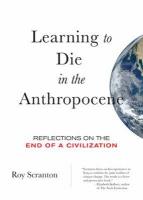 Rather than start his book about climate change with a solitary man contemplating a streambed run dry or taking in the eternal wonders of an old-growth forest, Roy Scranton begins Learning to Die in the Anthropocene in occupied Iraq in 2003, where Scranton served as a private in the U.S. Army.
Rather than start his book about climate change with a solitary man contemplating a streambed run dry or taking in the eternal wonders of an old-growth forest, Roy Scranton begins Learning to Die in the Anthropocene in occupied Iraq in 2003, where Scranton served as a private in the U.S. Army.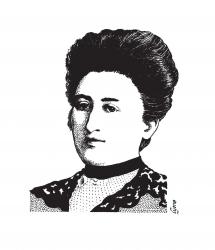 The editors of these volumes have provided an invaluable service, bringing renewed attention to the highly original and enduringly contentious critique of Capital that arose from one of the most universally revered figures of the revolutionary movement.
The editors of these volumes have provided an invaluable service, bringing renewed attention to the highly original and enduringly contentious critique of Capital that arose from one of the most universally revered figures of the revolutionary movement. E.P. Thompson (1924–1993) wore several hats during his life. His magnum opus as a historian was The Making of the English Working Class, one of the greatest history books written in the twentieth century in any language. He fought tirelessly for nuclear disarmament in the 1980s, which almost surely took years off his life.
E.P. Thompson (1924–1993) wore several hats during his life. His magnum opus as a historian was The Making of the English Working Class, one of the greatest history books written in the twentieth century in any language. He fought tirelessly for nuclear disarmament in the 1980s, which almost surely took years off his life. Temma Kaplan’s Democracy: A World History arrives at a timely moment. With presidential candidates and U.S. officials alike evoking the term “democracy” as a justification for political movements or a pretense for extraterritorial violence, Kaplan’s history of democracy offers a sorely needed study at an opportune time.
Temma Kaplan’s Democracy: A World History arrives at a timely moment. With presidential candidates and U.S. officials alike evoking the term “democracy” as a justification for political movements or a pretense for extraterritorial violence, Kaplan’s history of democracy offers a sorely needed study at an opportune time. The American left is today confronted with a situation it has not dealt with in some time—something approaching broader political relevance. From the rise of Occupy to Black Lives Matter to the Bernie Sanders campaign, movements of the left are having a sustained impact on American politics that they have not had for decades.
The American left is today confronted with a situation it has not dealt with in some time—something approaching broader political relevance. From the rise of Occupy to Black Lives Matter to the Bernie Sanders campaign, movements of the left are having a sustained impact on American politics that they have not had for decades. China has the world’s largest population, about 1.4 billion people, with a working age population of about 950 million, hundreds of millions of them wage laborers. Most of us know little about the Chinese workers or the recent workers’ movement that has developed so rapidly, especially since the 1990s.
China has the world’s largest population, about 1.4 billion people, with a working age population of about 950 million, hundreds of millions of them wage laborers. Most of us know little about the Chinese workers or the recent workers’ movement that has developed so rapidly, especially since the 1990s.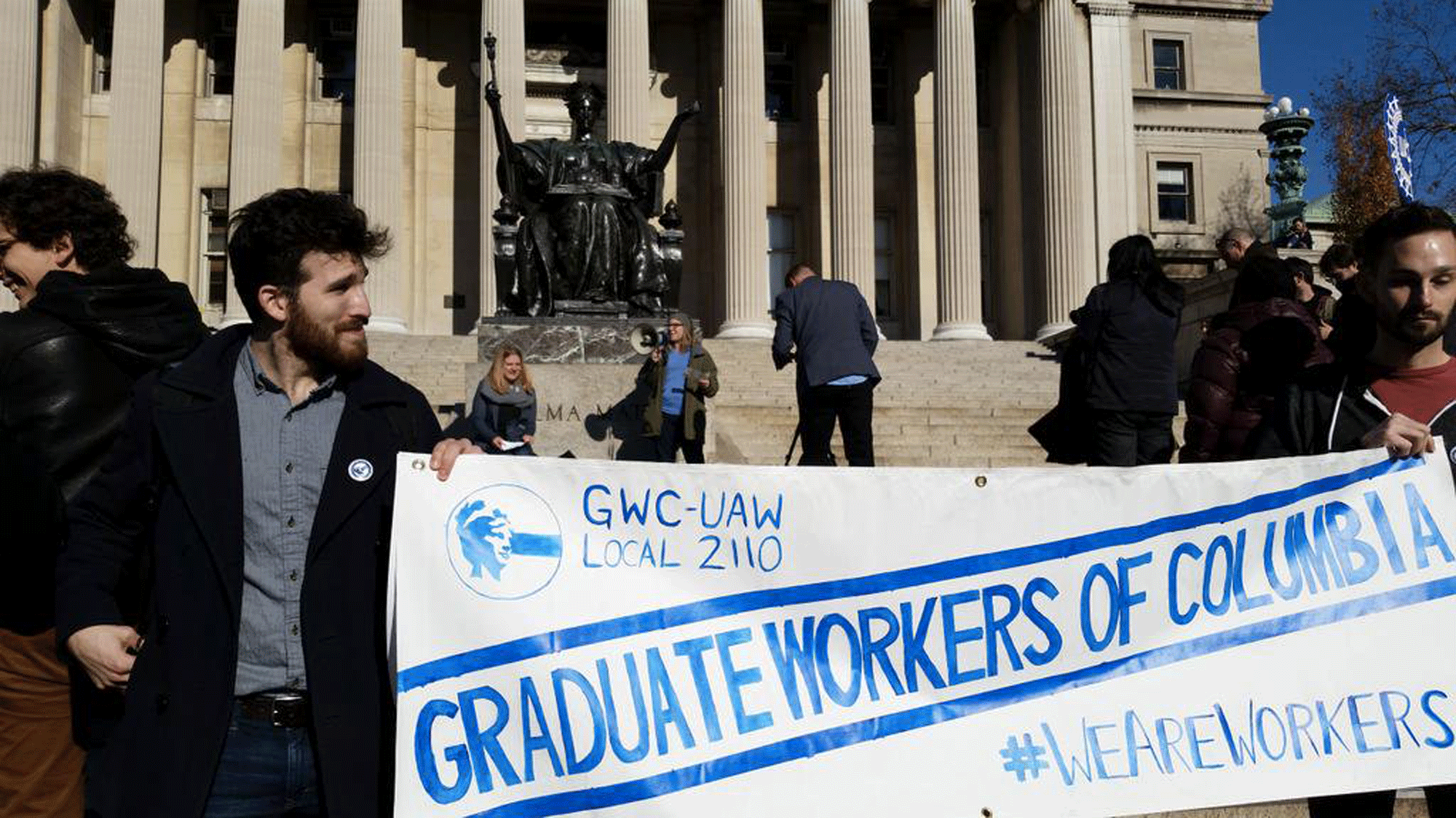 In the clear, critical light of day, illusory administrators whisper of our need for institutions, and all institutions are political, and all politics is correctional…Politics proposes to make us better, but we were good already in the mutual debt that can never be made good. We owe it to each other to falsify the institution, to make politics incorrect, to give the lie to our own determination. We owe each other the indeterminate. We owe each other everything.
In the clear, critical light of day, illusory administrators whisper of our need for institutions, and all institutions are political, and all politics is correctional…Politics proposes to make us better, but we were good already in the mutual debt that can never be made good. We owe it to each other to falsify the institution, to make politics incorrect, to give the lie to our own determination. We owe each other the indeterminate. We owe each other everything. 










 Four years following its liberation, the predominantly agricultural town of Daraya, strategically located near the capital, has fallen to the regime. A deal was reached to evacuate the 4,000-8,000 civilians remaining from a pre-uprising population of 300,000. The local fighters who defended their town so courageously will go to Idlib and join the resistance there.
Four years following its liberation, the predominantly agricultural town of Daraya, strategically located near the capital, has fallen to the regime. A deal was reached to evacuate the 4,000-8,000 civilians remaining from a pre-uprising population of 300,000. The local fighters who defended their town so courageously will go to Idlib and join the resistance there.



 Ecosocialism is an attempt to provide a radical, civilizational alternative to capitalism, rooted in the basic arguments of the ecological movement, and in the Marxist critique of political economy. It opposes to capitalism’s destructive progress (Marx) an economic policy founded on non-monetary and extra-economic criteria: social needs and ecological equilibrium.
Ecosocialism is an attempt to provide a radical, civilizational alternative to capitalism, rooted in the basic arguments of the ecological movement, and in the Marxist critique of political economy. It opposes to capitalism’s destructive progress (Marx) an economic policy founded on non-monetary and extra-economic criteria: social needs and ecological equilibrium.